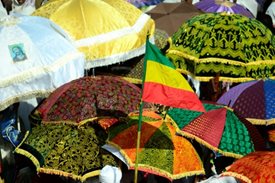
Ethiopians have strong ties to Judeo-Christian traditions, dating back, so they believe, to the times of the Biblical King Solomon and his “…very dark but lovely” lover, the Queen of Sheba. Ethiopia’s rulers believed they were directly descended from Solomon and Sheba’s son Menelik. Scholars debate the actual origin of Ethiopian Judaism, which may have emerged as an offshoot of Christian communities in the Middle Ages, or may date back to pre-Christian times. What is not in doubt, however, is the resilience of both faiths today: the Ethiopian Jewish traditions are alive and well in Israel today, while Ethiopian Orthodoxy is currently the majority faith within the country, its major feast days celebrated with a vibrancy and energy that is unique to this fascinating nation.
Like their Eastern Orthodox brethren in Greece, the Balkans, the Caucuses, and Russia, Ethiopian Orthodoxy follows the Julian calendar, rather than the more accurate Gregorian calendar adopted by the Western Christians in the 16th Century. The thirteen-day discrepancy that developed over the subsequent centuries means that Ethiopia celebrates holidays later than Roman Catholics or Protestants: Christmas, for example, takes place on January 7th, and Epiphany or Twelfth Night on January 19th.
Epiphany, more commonly referred to as Theophany in the Eastern tradition, celebrates two separate, but equally important milestones in the life of Jesus Christ. Western Christians place more emphasis on the visit of the three wise men or three kings to the infant Jesus in Bethlehem. Eastern Christians venerate the baptism of the adult Jesus by John the Baptist in the River Jordan. The Synoptic Gospels tell that after his baptism, Jesus went into the desert for 40 days, where he overcame temptation by Satan, and subsequently began his public ministry.
Both branches celebrate these events as symbolic of an important manifestation, a revelation of God through his Son made human. In the Eastern tradition, Theophany is celebrated with ritual immersion in holy water as a renewal of baptismal vows. In Ethiopia, this ritual bathing is accompanied by entirely unique parade of the
tabot, an object that brings the story right back to the Queen of Sheba.
A tabot is a replica of stone tablets or a box in which the tablets are stored, carefully kept wrapped in elaborate draping and revered as an essential religious object in every church in Ethiopia. The tabot symbolizes the original Ark of the Covenant, built by the followers of Moses to house the stone tablets on which God inscribed the Ten Commandments.
Jewish tradition believes that King Solomon built the First Temple of Jerusalem to house the Ark in the 9th Century BCE, only to have it disappear without a trace when the Babylonians sacked the temple in 586 BCE. The Ethiopians, however, believe that Menelik paid a visit to Solomon in Jerusalem and returned to Ethiopia in the company of a number of Hebrew nobles from the Tribe of Dan, who brought the Ark with them under great secrecy and hid it in Ethiopia for centuries, where, Ethiopians believe, it remains today. The Ethiopian tabot is heavily guarded by an order of celibate monks who take an oath upon their ordination to remain within the confines of the church walls, protecting it until death releases them. Only one man, “The Guardian” is ever allowed to see the inside of the tabot and is sworn to secrecy about what lies under the wrapping.
Today, each Ethiopian church houses and reveres its own tabot; if a church has no tabot, then the faithful consider it merely a building of no religious significance. The tabot is kept inside the church on all days apart from Timkat, when it is ceremoniously brought out on the eve of Timkat and immersed in holy water.
Once the solemnity of the ritual immersion of the tabot is complete, the Timkat celebration erupts into a vibrant celebration: mass bathing, music, feasting and a colorful parade through the streets, participants shielding themselves from the hot sun under brightly embroidered umbrellas. Timkat perfectly fuses a reverence for the ancient traditions with a passionate public celebration that is uniquely Ethiopia’s own.
Join Alexander + Roberts on a dedicated departure of our bespoke
Adventures in Ethiopia itinerary during Timkat to enable our guests to experience the sights and sounds celebration of Ethiopia’s unique Epiphany. Speak to one of our knowledgeable reservations agents for more information on this special departure, and others like it, designed to highlight Ethiopia’s unique culture and traditions.